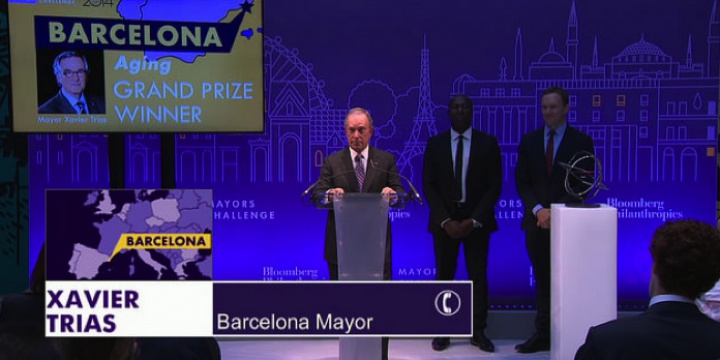
Innovative projects to solve social problems
The main social challenges that can be seen across big European cities, such as unemployment, the aging population, health, transport, education and housing, will not be solved with the same responses that we have used in the last 20 years. Whether it be because challenges are increasingly bigger or because the solutions applied up until now have proven to be insufficiently efficient, the fact of the matter is that cities need new responses, ones that are more efficient and with a greater capacity of being upscaled to achieve dimension.
With this in mind, the Bloomberg Philanthropies Foundation launched a competition, open to all European cities, to present new ideas to solve critical social problems and improve citizens’ quality of life: the Bloomberg Mayors Challenge. Proposing that mayors prepare creative projects that could make use of new and old technology and that could be replicated in other cities. Creativity, potential impact, transference and feasibility for implementation were especially valued.
Michael Bloomberg announced, on the 17th of September, at an event in Paris, that Barcelona was the winning project and city!
The winning project
The Vincles project, presented by Barcelona city, proposes to break the social isolation seen in its elderly citizens by establishing a network of close support, that includes family, friends, social workers and volunteers. The project is especially innovative because it combines digital technology and traditional support strategies. In this way Vincles makes it possible to identify disconnections in care, coordinate help and improve the quality of life. In using the latest digital technology small help units are made more useful and relevant, helping to coordinate family and friends in caring for the person while establishing contact between health professionals and the social services and all the people surrounding the person in order to improve follow-up care.
The aim is to make the most of networked solutions that get citizens involved in solving a big social challenge and that make the most of digital technology to coordinate and improve the effectiveness of actions.
The first Vincles prototype will be tested across 20 users before the end of the year. After that, another test will take place with 200 users, in order to later make the full deployment reaching 20,000 persons, because they generate 20,000 trust networks, made up of approximately 100,000 people
Other Winning Cities
Barcelona was awarded first prize, but another four European cities will receive the second prize of one million euros with the following projects:
Athens (Greece): has been awarded the prize for the SynAthina project, an online platform used to put civil society in contact with institutions and the government in order to investigate cooperative solutions to local problems and revitalise the neighbourhoods of the Greek capital.
Kirklees (UK): Comoodle, the Kirklees Shares Project, is a device used to pool assets that are underused or not used at all and release them so that communities can use and share them, in line with the opportunities that the collaborative economy generates.
Stockholm (Sweden): an urban comprehensive programme confronting ecological challenges such as waste and climate change challenges, with biochar being produced from garden waste. Biochar is and organic carbon that can be used as a soil conditioner to increase the growth of plants and trees in the city. The increase in green zones with foliage in the surrounding area helps to create a greener and healthier city environment.
Warsow (Poland): the Polish capital won with Virtual Warsaw, an initiative used to deploy thousands of panels that are activated from mobile apps in order to provide useful information to those with vision problems so that they can be more self-sufficient, aiding their outing.
Congratulations Barcelona
From UpSocial, we would like to congratulate the mayor of Barcelona, Xavier Trias; the deputy mayor Maite Fandos; the area manager of Quality of Life, Equality and Sports, Àngel Miret; and the project manager, Josep Maria Miró, and all the team for the work carried out up until now. We are proud of our contribution in designing the proposal and we thank the Council for their trust.